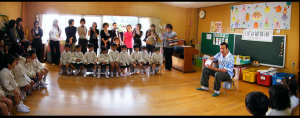 A new study goes beyond Amy Chua’s Battle Hymn of the Tiger Mother to examine the differences between Asian American and European American parenting (photo by Emran Kassim).
A new study goes beyond Amy Chua’s Battle Hymn of the Tiger Mother to examine the differences between Asian American and European American parenting (photo by Emran Kassim).
The study by Stanford researchers Alyssa Fu and Hazel Markus explores how those differences impact the mother daughter relationship and the mother’s ability to motivate her child.
Asian American children are encouraged to be dependent on their mother and mother’s are more directly involved in their children’s education, according to Fu.
On the other hand, independence is emphasized more in European American culture. Children are encouraged to see themselves as separate from their moms and because of that researchers say their moms are less easily able to motivate their children academically.
The authors also found Asian American children feel more pressure from their moms but that pressure didn’t decrease the support they felt their mothers gave them.
LATEST STORIES
It was just the opposite for European American children. The more pressure they felt from their mom, the less support they felt. Any pressures is perceived as negative by these children and are more likely to assert their independence.
When thinking about their moms, Asian American children are more likely to want to complete a task even after failure. European Americans are more motivated when thinking about themselves.
The study is published in the Personality and Social Psychology Bulletin, the official journal of the Society of Personality and Social Psychology (SPSP)
What is your experience with this? Would the results had been difference if they disaggregated data from the different Asian American subgroups? Share your thoughts. We’d love to hear them.









RE: Study Examines differences between Asian American and white parenting. awesome article is there a source?
RE: Study Examines differences between Asian American and white parenting: Here is more information on this topic: http://j.mp/1mJWfdO
RE: New study compares Asian American parenting methods with European American parents: http://psp.sagepub.com/content/early/2014/04/11/0…
^ Link to the study for those interested in reading the entire paper (still behind a paywall…).
In summary, the focus of the paper is to explain how pressure by mothers can motivate (East) Asian American high school students to achieve success and persist after failure. At the heart of the theory is that Asian American students view themselves as interdependent with their mothers, while European American students view themselves as independent from their mothers. Therefore, pressure by mothers exerted in an interdependent way is motivating for Asian American students, whom view it as interdependent support, whereas pressure by mothers impairs European American students because it is seen as detracting from their individual accomplishments that highlight personal strengths.
It seems to me that the important point to take away from this study is that the level of parental involvement in parenting ought to be based on the individual experiences and social realities of the child (the authors refer to this as "cultural contexts"). Asian American students benefit from "Tiger Mother" parenting because it complements their Asian American experiences (e.g. parents are 1st or 2nd generation, and stereotyped as model minorities and perpetual foreigners). In other words, Asian Americans are brought-up within cultural contexts at home that are similar to those found within East Asian contexts that highly value self-improvement as the means for motivation, such that "Tiger Mother" parenting can be seen as a lesser form of East Asian mother parenting. From my experience, I would also add that because of the model minority myth and perpetual foreigner stereotype, Asian American students are less likely to receive adequate and timely help from teachers and instructors, and more likely to feel alienated from the classroom than European American students. Therefore, an interdependent approach to parenting may be more beneficial to Asian American students than a hands-off parenting style that is seemingly appropriate for European American students.
However, the problem that I have with this study (thoughts for future work?) is that according to the researchers, the cultural contexts of Asian American and European American students can be replaced with two models of self: 1) based on interdependency with with one's close others, and 2) based on independence from one's close others. This assumes that Asian American and European American cultural contexts are mutually exclusive from one another, but I would argue that in spite of perceived cultural differences, there are areas of cultural overlap that the two models of self fail to capture. For example, the model minority myth characterizes Asian American students as academic superstars that obscures the social realities that not all Asian Americans succeed academically, even within the demographic of Chinese Americans in which the "Tiger Mother" belongs, and more importantly, encroaches on the individual achievements of Asian American students that highlight personal strengths such as hard-work and creativity. The question that I would ask here is: if, in fact, the two models of self are not mutually exclusive from one another, then how does one determine which model is prevalent within any given situation? I feel that this study does not adequately answer the question of how to best motivate children, instead it seems to suggest that Asian Americans succeed and persist after failure because of culturally-based factors that stem from irreconcilable cognitive differences. To me, this is unacceptable.